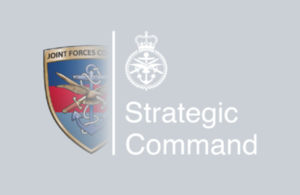Joint Forces Command to Strategic Command, the journey
A summary of Joint Force Command’s (JFC) journey to Strategic Command.

UKStratCom logo and crest - half the old JFC crest logo and the transition to the new Strategic Command logo.
Following Lord Levene’s report on defence reform (PDF, 1.22mb) in 2011, it was recommended that a joint service organisation should be formed within the Ministry of Defence (MOD) to better support our UK Armed Forces.
In 2012, JFC was established and became responsible for joint operations, intelligence, medical services, information systems, training and education, special forces and our overseas bases.
In 2018, 7 years after Levene’s initial recommendation, the Chief of Defence Staff (CDS), General Sir Nick Carter and the Permanent Secretary for the MOD, Sir Stephen Lovegrove, directed that a review of JFC should be undertaken. The purpose of the review was to identify ways that JFC could be adapted to better support the MOD’s outputs.
The outcome of the review validated the contribution of JFC to date, but it went further in recommending that JFC should take on an enhanced role with more responsibilities on behalf of defence, these include:
- providing leadership in the cyber domain for the MOD
- generating and developing capabilities for defence across the land, sea, air, cyber and space domains
- preparing for and coordinating joint operations
- educating and training the joint force of today and of the future
- leading in the information environment for defence and providing the MOD’s information and communication technology systems.
JFC has been renamed Strategic Command to better reflect the contribution it makes to defence.